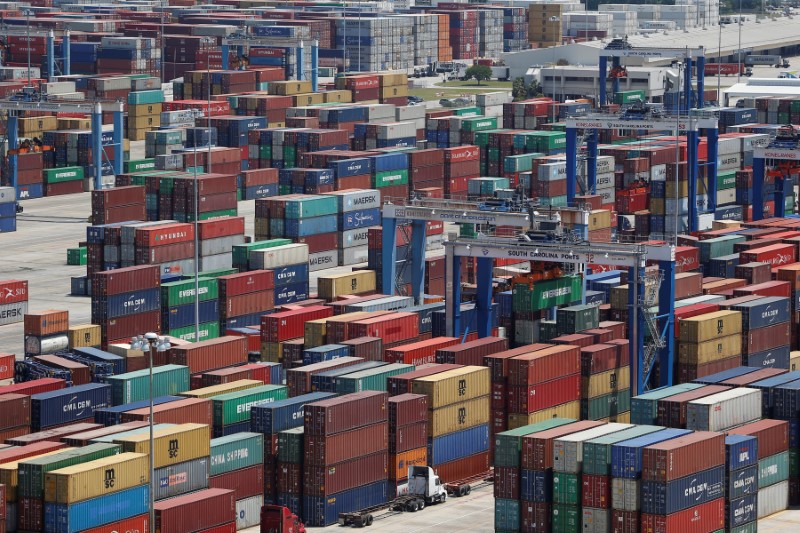By Rahul Karunakar
BENGALURU (Reuters) - The initial trade deal between Washington and Beijing is unlikely to provide a significant boost to the U.S. economy and will only reduce the downside risk or at best help activity moderately, a Reuters poll showed.
While financial markets were optimistic in the run-up to and after the trade agreement - with U.S. stocks hitting all-time highs last week - the growth and inflation outlook in the latest poll was little changed from the previous few months.
The Jan. 16-22 Reuters poll of over 100 economists - taken as business leaders gathered at the World Economic Forum in Davos to be greeted by the IMF cutting its global growth forecasts again - showed a significant pickup in the U.S. economy was not on the cards.
"The recent Phase 1 deal between the U.S. and China suggests decreasing odds of an escalation to a full-blown trade war. However, the deal so far is not comprehensive enough to significantly boost economic momentum," said Janwillem Acket, chief economist at Julius Baer.
That was also clear from predictions for the Federal Reserve to remain on the sidelines this year and on expectations the next likely move would be a cut rather than a hike.
"It is almost a one-way bet on the Fed right now, that either they are on hold or they are easing this year. I mean there is virtually no chance of tightening," said Jim O'Sullivan, chief U.S. macro strategist at TD Securities.
Reuters polls over the past couple of years have repeatedly pointed to the U.S.-China trade war as the prominent downside risk for the American economy and warned it would bring the next recession closer.
Now, despite a signed trade agreement, albeit a partial one, the chances of a U.S. recession were similar to predictions in recent months - around 20-25% in the next 12 months and about 30-35% in the next two years.
"Recession odds, which we peg at roughly one-in-four in 2020, will wax and wane with developments on the trade war front," said Sal Guatieri, senior economist at BMO.
"While recent progress is encouraging, we remain skeptical that a broad accord can be reached this year as complex issues, such as state industry subsidies and forced technology transfers, still need to be resolved."
All 53 respondents polled said the latest deal would either "reduce the downside risk to the U.S. economy" or "help U.S. economic growth moderately." Not a single economist said it would "significantly boost growth."
Reuters poll graphic on the U.S. economic outlook https://fingfx.thomsonreuters.com/gfx/editorcharts/USA-ECONOMY-POLL/0H001QXXSBK3/index.html?eikon=true
The U.S. economy will coast with annualized growth expected to have barely moved from the latest reported rate of 2.1% at the end of the forecast horizon - the second quarter of 2021.
"The growth slowdown has probably troughed, but we do not anticipate a V-shaped recovery," noted Kevin Loane, senior economist at Fathom Consulting.
While the schism in forecasters' views was clear, with 28 respondents saying the risks to their growth forecasts were skewed more to the upside and 22 seeing downside risks, most economists agreed any significant boost was unlikely.
That was largely attributed to several other events which could prove disrupting - including a period of uncertainty in the lead-up to the U.S. presidential election in November.
"Our views for 2020 are upbeat but cautious. A rebound from last year's global manufacturing and trade slump is likely, but businesses will be hesitant to invest amid a host of ongoing uncertainties," said James Sweeney, chief economist at Credit Suisse (SIX:CSGN).
With little change expected in the inflation outlook compared to recent months, all 105 economists polled forecast the Fed would keep rates unchanged at 1.50-1.75% when it meets Jan. 28-29.
The Fed was forecast to extend that pause through to the end of 2021 at least, with the probability of a rate cut this year seen at 30%.
While there was a clear sense of near-term optimism among economists compared with last year, nearly 75% of respondents forecast growth to be below the latest reported rate of 2.1% by mid-2021, up from around 60% in December.
"The (trade) deal may encourage some business investment in the near-term, but the deal is only a temporary and unstable equilibrium. It is very likely to break down, and that would undermine confidence again. So any boost to economic growth will be short-lived," said Philip Marey, senior U.S. strategist at Rabobank.

Reuters poll graphic on U.S. recession probability https://fingfx.thomsonreuters.com/gfx/editorcharts/USA-ECONOMY-POLL/0H001PBJD5BF/index.html?eikon=true
(Additional reporting, polling and analysis by Indradip Ghosh, Sumanto Mondal and Nagamani Lingappa; Editing by Ross Finley and Andrea Ricci)